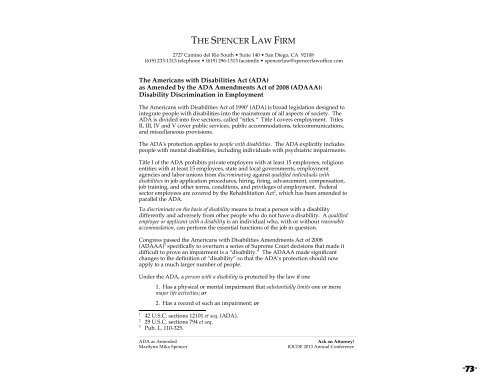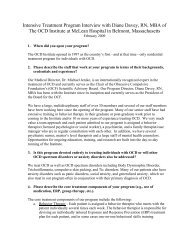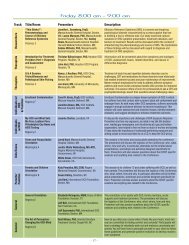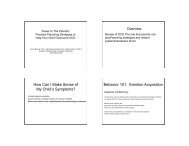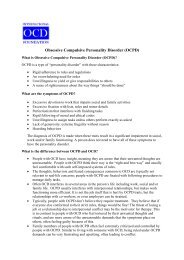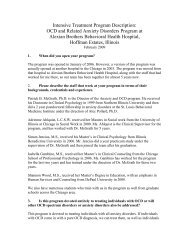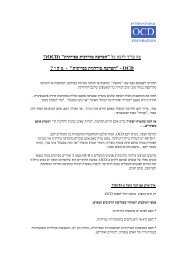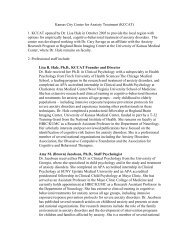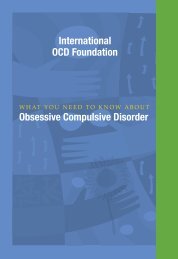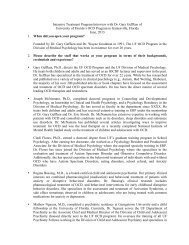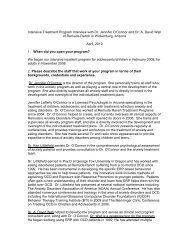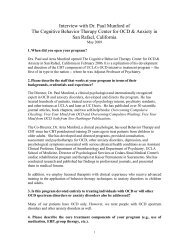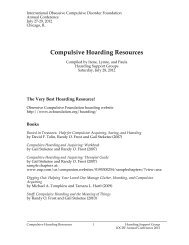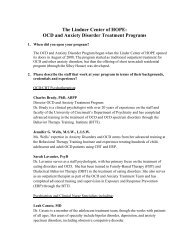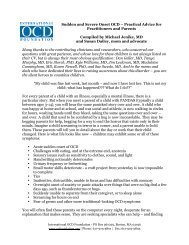perfectionism and - Obsessive-Compulsive Foundation
perfectionism and - Obsessive-Compulsive Foundation
perfectionism and - Obsessive-Compulsive Foundation
You also want an ePaper? Increase the reach of your titles
YUMPU automatically turns print PDFs into web optimized ePapers that Google loves.
THE SPENCER LAW FIRM<br />
2727 Camino del Rio South • Suite 140 • San Diego, CA 92108<br />
(619) 233-1313 telephone • (619) 296-1313 facsimile • spencerlaw@spencerlawoffice.com<br />
The Americans with Disabilities Act (ADA)<br />
as Amended by the ADA Amendments Act of 2008 (ADAAA):<br />
Disability Discrimination in Employment<br />
The Americans with Disabilities Act of 1990 1 (ADA) is broad legislation designed to<br />
integrate people with disabilities into the mainstream of all aspects of society. The<br />
ADA is divided into five sections, called ”titles.“ Title I covers employment. Titles<br />
II, III, IV <strong>and</strong> V cover public services, public accommodations, telecommunications,<br />
<strong>and</strong> miscellaneous provisions.<br />
The ADA's protection applies to people with disabilities. The ADA explicitly includes<br />
people with mental disabilities, including individuals with psychiatric impairments.<br />
Title I of the ADA prohibits private employers with at least 15 employees, religious<br />
entities with at least 15 employees, state <strong>and</strong> local governments, employment<br />
agencies <strong>and</strong> labor unions from discriminating against qualified individuals with<br />
disabilities in job application procedures, hiring, firing, advancement, compensation,<br />
job training, <strong>and</strong> other terms, conditions, <strong>and</strong> privileges of employment. Federal<br />
sector employees are covered by the Rehabilitation Act 2 , which has been amended to<br />
parallel the ADA.<br />
To discriminate on the basis of disability means to treat a person with a disability<br />
differently <strong>and</strong> adversely from other people who do not have a disability. A qualified<br />
employee or applicant with a disability is an individual who, with or without reasonable<br />
accommodation, can perform the essential functions of the job in question.<br />
Congress passed the Americans with Disabilities Amendments Act of 2008<br />
(ADAAA) 3 specifically to overturn a series of Supreme Court decisions that made it<br />
difficult to prove an impairment is a “disability.” The ADAAA made significant<br />
changes to the definition of “disability” so that the ADA’s protection should now<br />
apply to a much larger number of people.<br />
Under the ADA, a person with a disability is protected by the law if one<br />
1. Has a physical or mental impairment that substantially limits one or more<br />
major life activities; or<br />
2. Has a record of such an impairment; or<br />
1<br />
2<br />
3<br />
42 U.S.C. sections 12101 et seq. (ADA).<br />
29 U.S.C. sections 794 et seq.<br />
Pub. L. 110-325.<br />
ADA as Amended<br />
Marilynn Mika Spencer<br />
Ask an Attorney!<br />
IOCDF 2013 Annual Conference<br />
-73-


